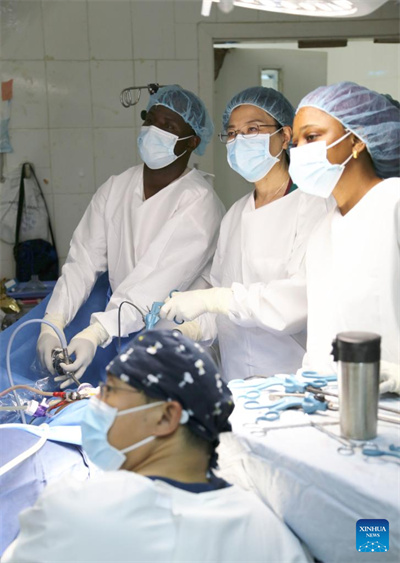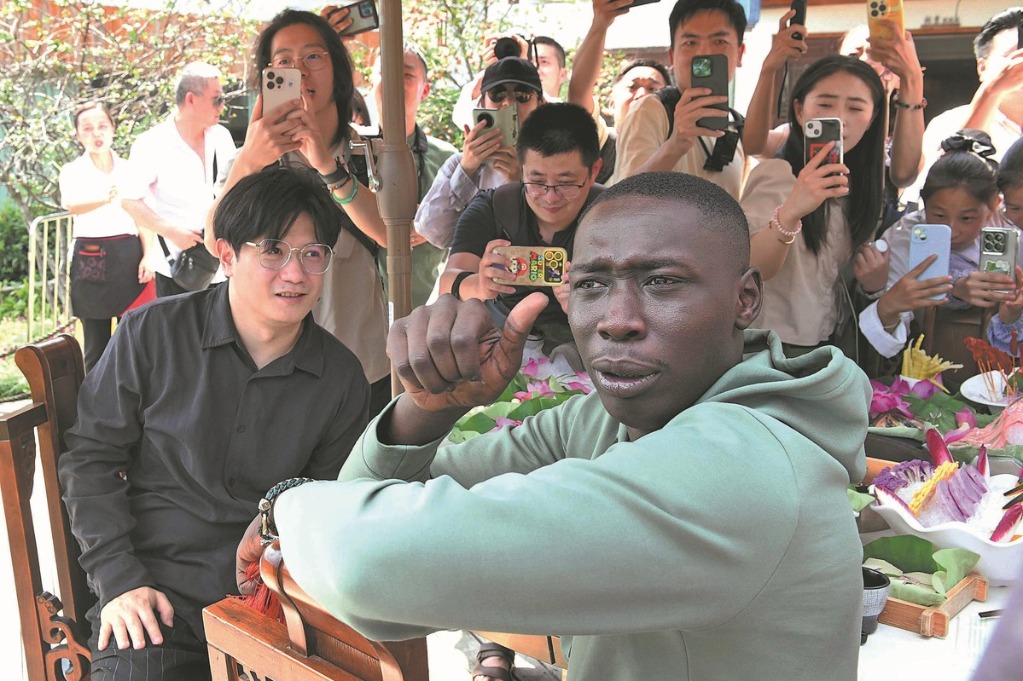Chinese doctors lend healing hands in the Gambia
Xinhua | Updated: 2025-03-29 08:47

On Monday afternoon in the obstetrics and gynecology operating room of Edward Francis Small Teaching Hospital in Gambia's capital Banjul, a local patient anxiously awaited her surgery.
There was a cyst in her right adnexal region, a condition that required laparoscopic exploration.
The lead surgeon for this operation was Yang Qing, director of the Department of Obstetrics and Gynecology at Shengjing Hospital of China Medical University.
She arrived in Banjul only two days earlier with four other medical professionals for a weeklong teaching and training program. The program was part of a medical assistance partnership between the two countries.
Serving as the first assistant was Cai Guiyang, a doctoral student of Yang's. Cai now leads the 22nd batch of the Chinese medical team in the Gambia.
Yang, 61, recalls that Cai began his clinical practice in 2010 and went on to provide medical aid in rural areas in 2019. "Seeing my student grow into an independent doctor, and even taking part in international medical assistance, fills me with immense pride and gratification," she says.
Also assisting in the operation were Kebba Gassama, an obstetrician-gynecologist at the hospital, and Mariama Baye, a nurse. Gassama and Baye, who received short-term training at Shengjing Hospital in China last year, have continued to gain experience under Cai's guidance since their return. Three generations of mentors and trainees stood together in the operating room, working to treat Gambian patients.
This surgery also gave Yang a glimpse of the progress made by Gambian medical professionals. "During training sessions, they used to observe from the sidelines. Now, they are actively participating in surgeries. Perhaps in the near future, they will be able to perform such procedures independently."
As the surgery commenced, Yang deftly maneuvered the laparoscopic trocar through the patient's navel into the abdominal cavity. Cai assisted while guiding Gassama through the procedure. As the probe slowly advanced, the affected area became distinctly visible on the monitor.
"Do you see it?" Yang gestured Gassama to focus on the screen, noting that the patient's condition was complex and required extra patience and precision. Gassama nodded attentively in response.
Cai, now an associate chief physician, says the operation felt like a "second examination" in his career.
"Performing surgery with my mentor is always a high-pressure experience."
The procedure went smoothly, removing the ovarian cyst that had blocked the fallopian tube, Cai recalls. "Every operation is a learning opportunity. Even the slightest deviation from protocol is immediately pointed out."
Now a mentor himself, Yang cherishes the chance to help his young Gambian colleagues.
"Helping them grow is also a way for me to improve," he says.
For Gassama, his time as a trainee in China feels like it was just yesterday.
"In China, we not only attended extensive theoretical lectures but also participated in daily teaching rounds, case discussions, and hands-on training," he says. "The practical experience was invaluable."
"The most unforgettable part was the simulation training," Baye adds. "The program in China deepened my understanding of minimally invasive surgery."
Upon returning to the Gambia, however, Gassama and Baye both became acutely aware of the gaps in local medical resources.
"The infection control standards in Gambian operating rooms need further improvement, as do the surgical environment, sterilization procedures, and aseptic conditions," Yang says.
She adds that China's medical aid goes beyond providing equipment. It aims to enhance Gambia's medical standards, quality control and personnel training.
"Today, they are my assistants. In the future, they will be independent surgeons, training the next generation of Gambian obstetricians and gynecologists skilled in laparoscopic surgery," Yang says.
























